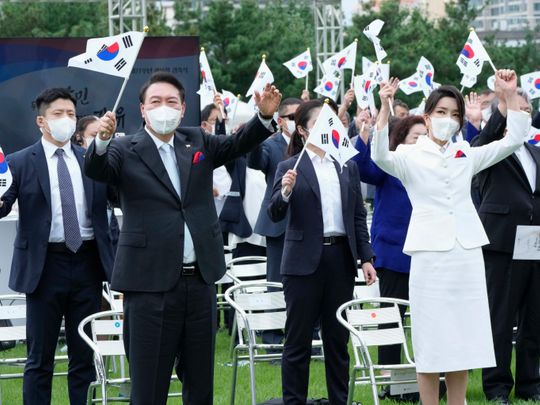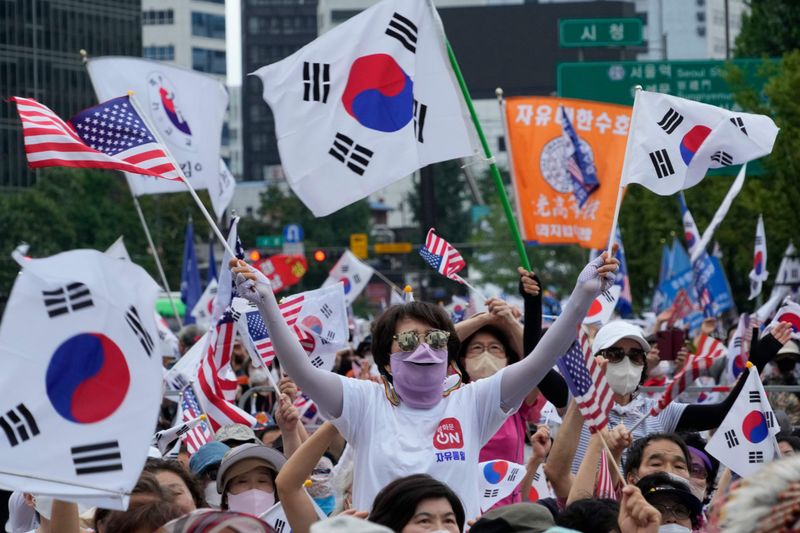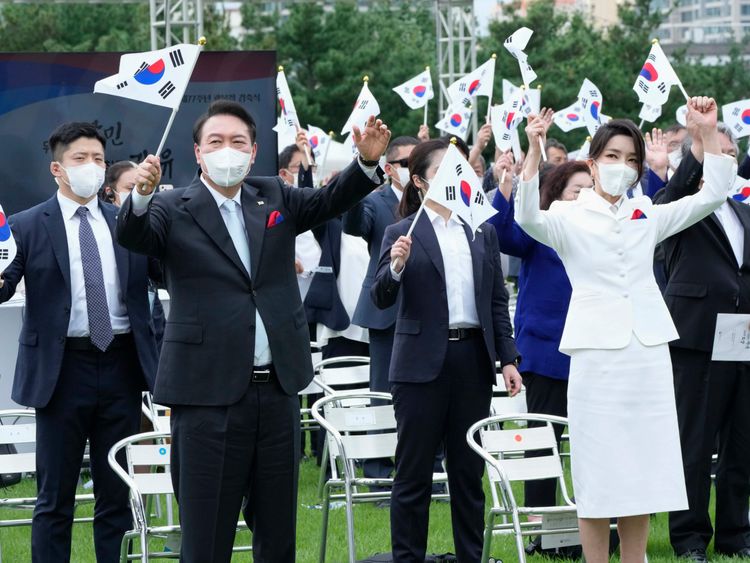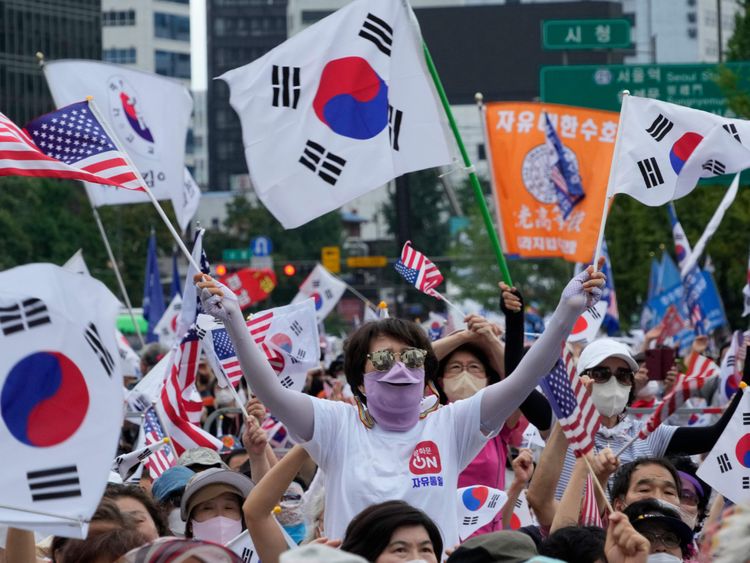
SEOUL, South Korea: South Korean President Yoon Suk Yeol offered “audacious’’ economic assistance to North Korea on Monday if it abandons its nuclear weapons programme, while avoiding harsh criticism of the North days after it threatened “deadly’’ retaliation over a COVID-19 outbreak it blames on the South.
In a speech celebrating the end of Japan’s colonisation of the Korean Peninsula, Yoon also called for better ties with Japan, calling the two countries partners in navigating challenges to freedom and saying their shared values will help them overcome historical grievances linked to Japan’s brutal colonial rule before the end of World War II.
Yoon’s televised speech on the liberation holiday came days after North Korea claimed a widely disputed victory over COVID-19 but also blamed South Korea for the outbreak. North Korea insists leaflets and other objects flown across the border by activists spread the virus, an unscientific claim Seoul describes as “ridiculous.’’
His Highness Sheikh Mohammed bin Rashid Al Maktoum, Vice-President and Prime Minister of the UAE and Ruler of Dubai, also sent similar messages to the Korean President and Prime Minister Han Duck-soo on the occasion.
-- WAM
North Korea has a history of dialling up pressure on South Korea when it doesn’t get what it wants from the United States, and there are concerns that North Korea’s threat portends a provocation, which could possibly be a nuclear or missile test or even border skirmishes. Some experts say North Korea may stir up tensions around joint military exercises the United States and South Korea start next week.
Yoon, a conservative who took office in May, said North Korea’s denuclearisation is key for peace in the region and the world. If North Korea halts its nuclear weapons development and genuinely commits to a process of denuclearisation, South Korea will respond with huge economic rewards that would be provided in phases, Yoon said.
Kim Tae-hyo, Yoon’s deputy national security director, said Seoul is willing to provide economic rewards at each step of a phased denuclearization process if North Korea commits to a denuclearisation “roadmap’’ and proceeds with the ``freezing, declaration, verification and dismantlement’’ of its nuclear weapons programme.
Yoon’s proposal isn’t meaningfully different from previous South Korean offers that have already been rejected by North Korea, which has been accelerating its efforts to expand its nuclear weapons and ballistic missiles programs, seen by leader Kim Jong Un as his strongest guarantee of survival.
Agricultural production
“We will implement a large-scale programme to provide food, providing assistance for establishing infrastructure for the production, transmission and distribution of electrical power, and carry out projects to modernise ports and airports to facilitate trade,’’ Yoon said.
“We will also help improve North Korea’s agricultural production, provide assistance to modernise its hospitals and medical infrastructure, and carry out initiatives to allow for international investment and financial support,’’ he added, insisting that such programs would “significantly’’ improve North Korean lives.

Inter-Korean ties have deteriorated amid a stalemate in larger nuclear negotiations between North Korea and the US which derailed in early 2019 because of disagreements over a relaxation of crippling US-led sanctions on the North in exchange for disarmament steps.
North Korea has ramped up its missile testing activity in 2022, launching more than 30 ballistic missiles so far, including its first intercontinental ballistic missiles since 2017. Experts say Kim is intent on exploiting a favourable environment to push forward his weapons program while the UN Security Council is divided and effectively paralyzed over Russia’s war on Ukraine.
North Korea’s unusually fast pace in weapons tests also underscores its brinkmanship aimed at forcing Washington to accept the North as a nuclear power and at negotiating badly needed economic benefits and security concessions from a position of strength, experts say. The US and South Korean governments have also said North Korea is gearing up to conduct its first nuclear test since September 2017, when it claimed to have detonated a nuclear warhead designed for its ICBMs.
In the face of the growing North Korean threats, Yoon has vowed to bolster South Korea’s defence in conjunction with its alliance with the United States and also strengthen security ties with Japan, which also is alarmed by the North’s nuclear and missile programs.
South Korea’s relations with Japan declined to post-World War II lows over the past several years as the countries allowed their grievances over history to extend to other areas including trade and military cooperation.
While Yoon has called for future-oriented cooperation with Japan, history may continue to pose an obstacle to relations. The countries have struggled to negotiate a solution after Japanese companies rejected South Korean court rulings in recent years to compensate South Koreans who were subject to wartime industrial slavery, an issue that could cause a further diplomatic rupture if it results in the forced sales of the companies’ South Korean assets. Even as Yoon called for improved relations with Japan, his Foreign Ministry issued a statement expressing “deep disappointment and regret’’ after three members of Japan’s Cabinet visited and prayed at Yasukuni Shrine, which honors Japanese war dead, including some convicted war criminals. The shrine is seen in South Korea as a symbol of Japanese militarism.














